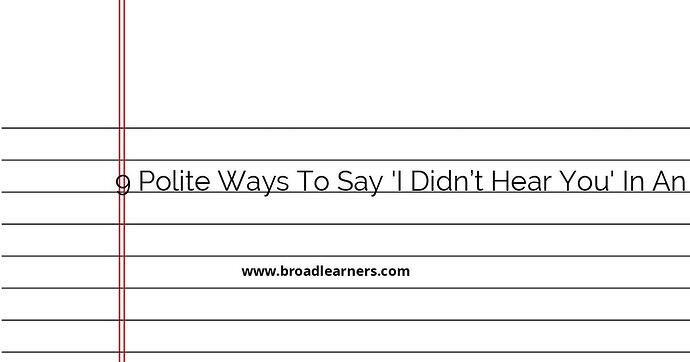Communication is a vital part of any professional setting, whether it's face-to-face or through email. However, there may be times when you didn't catch what the other person said in an email and need to ask them to repeat or clarify their message politely.
Here are nine polite ways to say 'I didn't hear you' in an email:
- Could you please repeat that?
- I'm sorry, I didn't catch what you said.
- I'm having trouble understanding what you meant.
- Could you kindly clarify what you meant?
- Apologies, but I missed that part.
- Would you mind restating your previous point?
- Excuse me, could you please provide more information?
- I'm sorry, but I didn't quite get what you were saying.
- Can you please rephrase your statement?
These phrases are polite and respectful, allowing you to communicate your difficulty in understanding without sounding rude or dismissive.
1. Could you please repeat that?
This is a straightforward and polite request for the other person to repeat what they said. It shows that you are genuinely interested in understanding their message.
Example:
Dear John,
Thank you for your email. I have a question regarding the second point you mentioned. Could you please repeat that part? I want to make sure I didn't miss any crucial details.
2. I'm sorry, I didn't catch what you said.
This phrase acknowledges that you may have missed something and apologizes for not grasping the information. It shows humility and a willingness to learn.
Example:
Hello Sarah,
Thank you for your email. I'm sorry, but I didn't catch what you said about the upcoming project deadline. Could you please reiterate the timeline? I want to ensure that I'm on track with my tasks.
3. I'm having trouble understanding what you meant.
By expressing that you're having trouble understanding, you convey that the issue may be due to your own comprehension rather than any fault of the sender. This phrase opens the door for further explanation or clarification.
Example:
Dear Emma,
Thank you for your email. I'm having trouble understanding what you meant by 'additional requirements' in the last paragraph. Could you please provide more details or examples? It would be greatly appreciated.
4. Could you kindly clarify what you meant?
This phrase combines politeness and a genuine desire for clarity. It emphasizes that you are seeking additional information to ensure effective communication.
Example:
Hi Michael,
Thank you for your email. I have a question regarding the proposed budget for our department. Could you kindly clarify what you meant by 'operating expenses'? I want to make sure I understand the categories involved.
5. Apologies, but I missed that part.
Using this phrase conveys your acknowledgment that you may have overlooked or not fully grasped a specific aspect of the message. It shows humility and a desire to correct any potential misunderstandings.
Example:
Dear Lisa,
Thank you for your detailed email. Apologies, but I missed that part where you mentioned the feedback from the client. Could you please resend that portion? I want to consider their input while finalizing the project plan.
6. Would you mind restating your previous point?
This phrase politely asks the sender to restate their previous point to help you fully understand their message. It implies that you value their input and want to ensure nothing gets lost in translation.
Example:
Hi Mark,
Thank you for your email. Would you mind restating your previous point regarding the changes in the marketing strategy? I want to make sure I fully grasp your proposed approach before our team meeting this afternoon.
7. Excuse me, could you please provide more information?
This expression conveys a polite request for additional information to aid in fully comprehending the message. It shows a proactive attitude towards seeking clarity.
Example:
Hey Alex,
Thank you for your email. Excuse me, but could you please provide more information about the budget allocations for the current project? I want to ensure I have a complete understanding before our budget review meeting tomorrow.
8. I'm sorry, but I didn’t quite get what you were saying.
This phrase acknowledges that you didn't fully grasp the sender's message and apologizes for any confusion. It opens the opportunity for the sender to rephrase or elaborate on their initial communication.
Example:
Hello James,
I appreciate your email. I'm sorry, but I didn’t quite get what you were saying about the new software implementation. Could you please elaborate on the challenges we might face during the transition?
9. Can you please rephrase your statement?
Sometimes, the problem lies in the way the sender phrased their statement. By requesting them to rephrase it, you demonstrate your willingness to work towards a better comprehension of their message.
Example:
Dear Rachel,
Thank you for reaching out. Can you please rephrase your statement about customer feedback? I want to make sure I accurately capture your observations and align them with the rest of our team's findings.
Did I miss anything? Respond below
